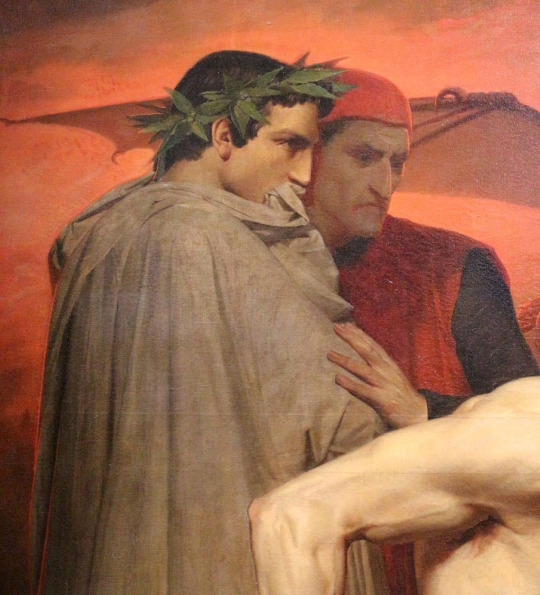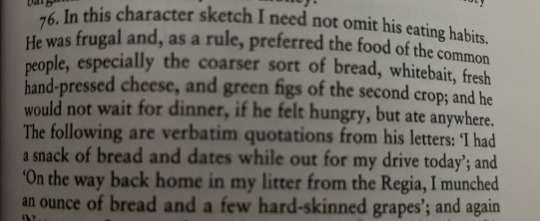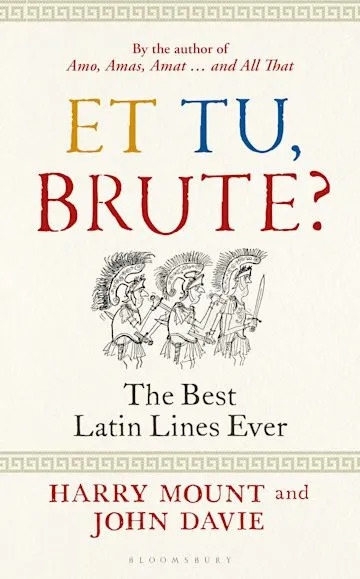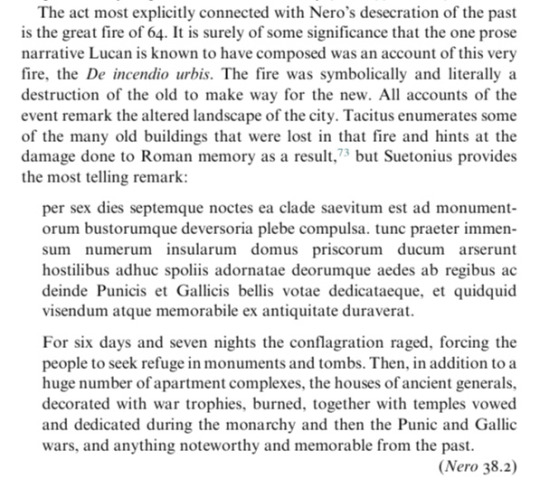#suetonius
Text
A TV series about the early Roman emperors, except:
It's a comedy.
It starts with Julius Caesar (who keeps correcting the narrator that he's a dictator, not an emperor, as if it makes any difference).
The narrator skips over military campaigns like the Gallic War and Claudius' conquest of Britain in favor of "Haha check out Augustus' shitty poetry" and "Caesar once tried to overthrow the republic with a wardrobe malfunction."
You can tell the narrator gets bored of certain emperors because he keeps going off on tangents about Julius and Augustus after they're supposed to be dead.
The characters get frustrated because they're trying to act out a serious drama but nooo the narrator would rather gossip and it's only 50% in chronological order.
Some of the characters start pointing out things the narrator says that are physically impossible, don't make logical sense, or which their enemies made up.
Tiberius storms out partway through his episode and the rest of the narrative has him played by a sock puppet voiced by Caligula doing a falsetto.
Caligula attempts to sic the Praetorian guards on the narrator for making up filthy lies about him. Like, he's still a huge dick, just not in the way the narrator claims.
Claudius just wants to teach the audience cool facts about the Etruscans but the narrator talks over him.
Nero is actually a Korean boy band singer who keeps trying to explain to people he's a musician, not the emperor, and isn't sure what he's doing in ancient Rome. No one listens.
Galba is played by Rob Halford, the "stately homo of heavy metal."
Galba, Otho and Vitellius have to share an episode, and even then the narrator half-asses it and leaves with 10 minutes of runtime to fill, at which point the characters (including the dead ones) break into the production studio and reveal the narrator is Suetonius.
#jlrrt speaks#suetonius#that prince of gossips <3#the twelve caesars#just roman memes#the twelve caesars is a comedy#jlrrt essays
712 notes
·
View notes
Text
Latin Literature Tournament - Round 1


Propaganda under the cut!
Suetonius Propaganda
I say this with all love and affection--Suetonius is so full of shit. Like reading a magazine in the grocery impulse aisle, in the best possible way
Has very cool intratextual bits and ring structures
He runs on pure vibes, and honestly I love this for him
Vergil Propaganda:
The vates himself, everyone. The poet so good that the Church was like "okay yeah this one magical pagan can stay"
The Fourth Eclogue is such a weird little delight. Is it about the children of Antony? Augustus? Is it a prediction of the birth of Christ? Is it somehow, as I heard one professor suggest for some reason, about Gallus? The possibilities are endless
Are you going to vote against the world-shattering masterpiece that is the Aeneid?
Side note, if you spell it "Virgil" you are my enemy
#tagamemnon#vergil#suetonius#classics#latin#latin literature#latin literature tournament#tumblr polls#tournament polls#bracket#virgil#history#epic#bucolic
82 notes
·
View notes
Text
“[Augustus’] shoes [were] somewhat high-soled, to make him look taller than he really was.”
I don’t know what's funnier: the possibility of Augustus actually wearing high heeled platform shoes, or Suetonius/someone having the idea to make this very specific detail up.
#tagamemnon#the twelve caesars#suetonius#augustus#octavian#ancient rome#Roman history#ancient history#roman empire#augustus caesar
728 notes
·
View notes
Text
the best part of twelve caesars is when suetonius spends a paragraph saying "augustus ate some dates and some cheese"

126 notes
·
View notes
Text
According to Suetonius Jul. 22.2, when Caesar was given the proconsulship of Transalpine Gaul, he basically exclaimed in the senate house, “suuuccck my diiicckk!”
62 notes
·
View notes
Text
The Second Day of Julius Caesar
Everyone knows what Julius Caesar's last words were. It's pretty much the most iconic line of all time! Et tu, Brute? (which means "And you, Brutus?") That is just pure poetry. Julius Caesar really is so cool. His last words were probably the best and most amazing last words anyone ever had ever.
Look, it's even one of The Best Latin Lines Ever according to the cover of this book.

But did Caesar really say it? (Nope!)
It's a Shakespearean invention! (that's going to be a common theme in this series) However, the idea that these were his last words actually isn't entirely Shakespearean. "Et tu, Brute?" weren't Julius Caesar's last words in the play! His true last words before dying were "Then fall Caesar."

Good golly that is old. But as you can see, Julius Caesar's last words here are "Et tu Brute?—Then fall Caesar." (forgive me, I mean Cæſar).
Aww look at him talking about himself in the third person. Adorable. Maybe my last words should be "Then fall @theromaboo."
While we're still on the topic of "Et tu, Brute?" I just want to fix a few of my pet peeves when people quote this. It is not "Et tu, Brutus?" Latin has cases. Brutus here is in the vocative because Caesar is calling Brutus by his name. The vocative of Brutus is Brute. It has to be Brute.
Neither is it "Et tu, Bruté." What is that accent doing? In modern Latin, acute accents are most commonly used to show that a syllable is stressed. And in ancient Roman Latin inscriptions, a mark that looks very similar to an acute accent (called an apex) is sometimes used to show that a vowel is long. Neither usage makes sense here with Bruté. I think what happened is that people are getting confused with French (a very common mistake!) and because Brute is pronounced with two syllables, people add an accent at the end to make it have two syllables, because without the accent, it would just be Brute, with one syllable, because that's how it works in French. But Latin doesn't care about that!
Anyway, there is no ancient source that says Julius Caesar's last words were "Et tu, Brute?" or "Then fall Caesar."
I can already hear an Italian saying "Those weren't Giulio Cesare's last words; he actually said tu quoque—" You're also wrong! (sorry italians)
There is no ancient source that says that Julius Caesar's last words were "Tu quoque, Brute, fili mi?" or "Tu quoque, mi fili?" or any other similar version (they all mean "You too, (Brutus), my son?" I find that the first one is generally used by Italians and the second is generally used by French people, and almost the entire continental Europe seems to use some sort of version of "Tu quoque. . ." However, there might be even more versions of Julius Caesar's last words in other languages. I only really interact with English, Italian, and French, so if you know any other versions from different languages, do tell me!)
Okay, now we know a lot of stuff Caesar didn't say, but what were Julius Caesar's real last words?
We don't know! (yipee!)
Shakespeare's main source was a translation of a translation of Plutarch's Parallel Lives, but nothing similar to the Shakespearean last words can be found there.
Plutarch tells us that after Caesar got a teeny little stab from Casca, he said in Latin, "Foulest Casca, what are you doing?" I'm assuming he said this in the exact same way the stepsister says to the stepbrother—but the annoying thing is that Plutarch doesn't give us the Latin, he just gives us the Greek translation of the Latin (classic Plutarch) (if you want to know the Greek, it's "Μιαρώτατε Κάσκα, τί ποιεῖς?")
Suetonius, meanwhile, gives us a different story. He says that right before the stabbing started, this dude called Cimber grabbed Caesar by the shoulders. Caesar said "Why, this is violence!" and then immediately got stabbed by Casca. Then he didn't say anything else throughout the stabbing; he just groaned at the first stab. So that means that his last words would've been, yes, "Why, this is violence!" ("Ista quidem vis est!" in Latin). Biggest understatement of 44 BC!

There is yet another common version of Caesar's last words, and they are "What is this? Such violence against Caesar!" which is bit of a poor interpretation of this.
Anyway, Suetonius says that "Some have written that when Caesar saw Brutus rushing at him, he said 'Καὶ σύ τέκνον?'" (which means "You too, child?") This is definitely most similar to the most common ideas of Julius Caesar's last words ("Et tu, Brute?" and "Tu quoque. . ."). Pretty much the only difference is that "Καὶ σύ τέκνον" is Greek. In fact, people often claim that Caesar's last words were "Tu quoque, Brute, fili mi?" by citing Suetonius, even though Suetonius doesn't say that.
I would treat this with a bit of caution though, because Suetonius is distancing himself from this claim, saying that "Oh, other people have written. . ." Clearly Suetonius doesn't really believe it himself. And, no offense to Suetonius, but if Suetonius is unsure of this, I would be too. Suetonius notoriously treats official government documents and rumors his nonna heard on the streets as equally valid sources.
Besides, would you be able to speak after being stabbed? I know Caesar isn't the average person, but Caesar is still a person. I'd imagine that one would be a bit too shocked to speak in such a high stress situation. And saying something deep about Brutus, no less! But, as always, I don't know for sure. Maybe Caesar did say something after getting stabbed, but I'm with Suetonius on this one and my best guess is that he did not.
Cassius Dio also writes about this. He pretty much says the exact same thing as Suetonius, except that he does not mention Caesar saying "Why, this is violence!" Dio also believes that Caesar didn't speak after he got stabbed, but he does mention "some writers" who say that Julius Caesar's said to Brutus "Καὶ σύ τέκνον?" (sound familiar?)
So yeah, moral of the story, no one can agree on Caesar's last words! Good gods, I spent the better half of my Saturday researching and writing this. I am so sorry for you poor souls who had to read all this. If you want to read the relevant parts of the ancient sources themselves, here they are:
Plutarch Parallel Lives, Julius Caesar, 66.7–8
Suetonius, Life of Julius Caesar, 82.1–2
Cassius Dio, Roman History, Book XLIV, 19.4–5
#the 15 days of julius caesar#julius caesar#roman history#ancient rome#et tu brute#tu quoque brute fili mi#history#cassius dio#suetonius#plutarch#ides of march#the ides of march
31 notes
·
View notes
Text
List of my absolute favourite Ancient Rome fanfic tropes:
Let's pick something wild Cicero accused someone of doing/Suetonius wrote and just run with it
Subverting the rigid Roman sex/gender norms
The inner dialogue expressing angst about subverting said norms
Oh my god, they were co-consuls!
There was only one military tent
Corrupting a good stoic with filthy, filthy Epicureanism
A purely innocent, platonic Greco-Roman wrestling match turns into something else
Senate shenanigans & shifting political alliances (now with extra tension!)
Let's reference Greek culture or straight up switch to Greek as a code for gay stuff
So Caesar's technically not there but you can feel his looming presence in every paragraph
Mommy issues or daddy issues? Why not both!
Bonus: the ultimate nerd/jock duo to end all nerd/jock duos
#roman republic#tagamemnon#roman history#bet you'll never be able to guess my favourite pairing#roman history memes#fanfic#fanfiction#ao3#fanfic tropes#ancient rome#cicero#suetonius#fanfiction tropes#history memes#julius caesar#this was brought to you by two months' worth of extensive research#worth it#ao3 memes
25 notes
·
View notes
Photo










caligula, gawain and the green knight / caligula (1979) dir. tinto brass / suet.calig.22, trans. myself / statue of caligula at naples
#im normal about him btw#caligula#gaius caesar augustus germanicus#caligula 1979#malcolm mcdowell#webweave#tinto brass#suetonius#parallel#web weaving#god complex#tagammemnon#rome#my posts#the trans myself BARELY deserves mentioning its such a small line lol#my webweaves#popular
119 notes
·
View notes
Text
Antony and Octavius' drunkenness compared

People made insulting jests at the expense of the young Octavius; they accused him of being so fond of fine furniture and Greek antiques that he would condemn a man in order to get hold of his coveted collections; and they declared that he used to get drunk and then cruelly add names to the lists of the proscribed.
Antony, on the contrary, when he was intoxicated, seems to have beamed upon the world in ineffable goodwill; and Plutarch, in his comparison between him and Demetrius, describes him under the influence of wine as being like Hercules deprived of his club and his lion's skin, and as wanting only to have a game with somebody.
Sources: Suetonius, Augustus, lxx.
Seneca, De Clementia, i, ix.
Plutarch's Life of Antony
Arthur Weigall, The Life of Times of Marc Antony
Image: Billy Zane as Mark Antony from the miniseries Cleopatra (1999)
#marc antony#mark antony#marcus antonius#plutarch#suetonius#seneca#augustus#caesar augustus#octavian#history#rome#ancient rome#roman history#roman republic#roman empire#billy zane
24 notes
·
View notes
Text
Suetonius's sources: Tiberius was left handed and was quite athletic.
Suetonius: He had a strong left hand, supposedly strong enough to crack the skull of a child or perhaps a young man, knowing his tastes...
Later historians: Suetonious says that Tiberius was so strong he would crack a guy's skull with his bare hand! He has supposedly done that once, because someone insulted his hair.
YouTube historians: SHOCKING FACT ABOUT ANCIENT ROME AND GREECE #69420!! DID YOU KNOW THAT TIBERIUS ONCE CRACKED A GUY'S WITH HIS BARE HANDS BECAUSEHE INSULTED HIS HAIRSTYLE?!?!?!? WHAT A CRUEL FUCKED UP EVIL MEANIE MAN!!!!!!
Tumblr history meme: lol, do you ever get a bad hair day and decide to squash a guy's skull? mood lmao
#ancient rome#suetonius#tagamemnon#roman history#academics#i wish i was exaggerating#history meme#roman meme#history memes#ancient rome memes
69 notes
·
View notes
Text
Times Caligula was probably fucking with people
I have a pet theory that at least some of Caligula's "madness" was really him being a huge troll and screwing with people, and that several incidents the ancient historians take seriously were shitty jokes taken out of context. From Suetonius, Gaius:
Wandering into emperor Tiberius' bedroom at night with a dagger, thinking, "Eh..." and wandering back out. (12)
Chucking money into crowds to make people scramble for it. (18, 26)
Telling people "I'm gonna fuck the moon." (22)
Getting into arguments with a statue of Jupiter. (22)
Constantly pranking his uncle Claudius. (23)
[Caligula's daughter violently attacks her playmates] Caligula: "Yep, she's definitely mine." (25)
Promising an exciting gladiator show and then swapping in old shitty fighters at the last second. (26)
Reminding people "I could kill you whenever I like." (29, 32)
Grumbling about how the empire was too peaceful and there was nothing heroic left for him to do. (31)
"Everyone reads Homer. I should ban him and see what happens." (34)
Leading an army to the coast, making them gather seashells as "spoils of war," then telling them "Treat yourselves!" on the tiny monetary bonus he awarded them. (46)
Practicing goofy faces in his mirror to freak people out. (50)
Invites three terrified senators to the palace in the dead of night. Jumps out from behind a curtain and does a song and dance number in drag. Refuses to explain. Leaves. (54)
Does not actually make his horse consul, but pampers it so much people said he wanted to. (55)
Taunts the praetorian guards with so many "sissy" jokes they get fed up and shank him. (56, 58)
When people heard he was dead they thought he was pulling a stunt. (60)
#i left out the really dark/gory stuff. reader beware if you look these up!#also take everything suetonius says with a truckload of salt. many of these stories are probably false#still funny tho#suetonius#caligula#jlrrt reads#jlrrt essays#the twelve caesars is a comedy
349 notes
·
View notes
Text
Suetonius : I'm gonna tell my kids this was Tiberius

#roman empire#roman history#roman emperor#rome#ancient history#ancient rome#tagamemnon#ancient rome meme#tiberius#suetonius
6 notes
·
View notes
Text

alain m. gowing, empire and memory: the representation of the roman republic in imperial culture
#i know i’ve posted this before but i can’t find it so. posting it again and tagging it this time ->#suetonius#but also BOLD of gowing to claim de incendio urbis was a prose narrative#you know what would be an even bolder claim??? [incomprehensible]#beeps
44 notes
·
View notes
Text


that was your first mistake
(Caligula's Sexual Desire for the Moon, David Woods)
#caligula#suetonius#ancient history#tagamemnon#julio claudian dynasty#emperor gaius#emperor caligula#queueusque tandem abutere catilina patientia nostra
15 notes
·
View notes
Text
From 43 BCE onward Octavian/Augustus did not speak in the senate, to the army, to the public, or even to individuals in private––including his own wife––without having written something beforehand and often reciting directly from a little book. Thus he was always reading a script "lest he should say too much or too little on the spur of the moment" (ne plus minusve loqueretur ex tempore, Suet. Aug. 84). This anecdote says much about Octavian/Augustus' character, that he could not trust himself to speak in moderation.
20 notes
·
View notes
Text
Was Britannicus a bastard, changeling, fake child, or something more sinister? (dun dun dun) (according to Nero)
All my information is coming from "Suet. Ner. 7.1: Britannicum subditivum" by Michael B. Charles. Pls pls pls read that if you want to hear what I'm going to say except 5000000 times more educated and detailed. This is just a little summary of what he said.
In Suetonius Nero 7, it is said that Nero tried to convince Claudius that Britannicus was "subditivus," after Britannicus deadnamed him (ancient Rome was a wild place). If you search it up in a dictionary, subditivus means stuff like substituted, counterfeit, spurious, fake, and other things along those lines. But, in this context, what exactly is it supposed to mean? That Britannicus is a bastard? That Britannicus isn't a human? That Britannicus is an imposter?
Unfortunately, we don't really know the exact meaning! If you look at how subditivus was most commonly used in other texts, you would be inclined to think that Britannicus is fake, supposititious, an imposter (though still a person! Just, not the real real Britannicus. Not the Britannicus Claudius believes him to be. Swapped at birth or something) and this is the most common interpretation, at least in English translations of this passage.
If you look more at the context, you'd likely be thinking that Nero was questioning Britannicus' legitimacy, saying that Brit wasn't actually Claudius' son. Interestingly, we actually question that even today! I personally say that we'll never know, but there are people out there who have much stronger opinions on this than I do. The most concerning theory I've found is that Caligula was Britannicus father (!?).
All in all, no matter the exact meaning Suetonius wanted to convey here, the big idea was that Nero was trying to convince Claudius that Britannicus was not what Claudius thought he was. However, Nero did not mean that Britannicus wasn't a real child, or that Britannicus was a changeling in the exact way we Tumblrites think when we hear that word.
Again, I really recommend you read the actual article because he says it much better then I ever could, plus you can see all the juicy details and stuff.
26 notes
·
View notes